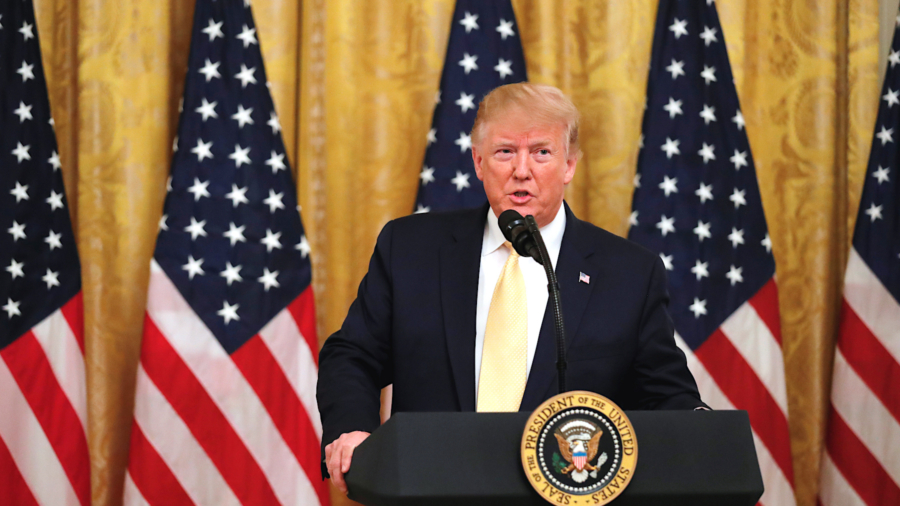U.S. President Donald Trump is “displeased” with the Chinese regime’s latest move to tighten its grip on Hong Kong, saying it would jeopardize the city’s status as a global financial center, the White House press secretary said on May 26.
Trump said that “he’s displeased with China’s efforts, and that it’s hard to see how Hong Kong can remain a financial hub if China takes over,” Kayleigh McEnany, press secretary, told reporters.
His remarks came amid growing anger at Beijing’s plan to introduce a national security law for Hong Kong that critics say would spell the end of the city’s autonomy.
The regime last week unveiled proposals for a national security law in Hong Kong, set to be passed by its rubber-stamp legislature—bypassing Hong Kong’s local legislature. The law would criminalize acts of “succession, subversion, and terrorism activities.” It would also allow Chinese security agencies to set up bases in the city. Critics fear the law would provide the Chinese regime with a cover to crack down on dissenting voices.
The move has drawn international condemnation and sparked protests in the city on Sunday and further demonstrations planned for this week.
Beijing and the Hong Kong government have defended the law, saying it would only apply to a minority of “criminals” or “secessionists.”
Hong Kong chief executive Carrie Lam said at a Tuesday press conference that she fully backed the move, insisting that the city’s freedoms would not be infringed upon by Beijing’s proposal.
“Enacting national security legislation will actually reinforce Hong Kong’s position as an international financial center,” she said.
However, U.S. officials and critics argue the law would do the opposite.
White House national security adviser Robert O’Brien said on Sunday the move would also jeopardize Hong Kong’s status as an international financial hub.
“I just don’t see how [the financial industry] can stay,” he told NBC. “One reason that they came to Hong Kong is because there was the rule of law there, there was a free-enterprise system, there was a capitalist system, there was democracy and local legislative elections. If all those things go away, I’m not sure how the financial community can stay there.”
O’Brien said that the draft legislation may lead to sanctions under the U.S. Hong Kong Human Rights and Democracy Act of 2019. Under this federal law, the secretary of state must certify every year if Hong Kong is sufficiently autonomous from the mainland to justify special trading privileges granted by the United States.
Last week, Secretary of State Mike Pompeo said the move marked the “death knell” for the city’s autonomy, guaranteed under the “one country, two systems” framework. When the city reverted to Chinese rule in 1997, the regime agreed to grant Hong Kong autonomy and freedoms not enjoyed in the mainland under this framework.
The U.S. Chamber of Commerce, which represents American companies in the city, said Tuesday that it was “deeply concerned” about the plans, urging the regime to preserve “one country, two systems.”
There are over 1,000 American businesses operating in Hong Kong.
“Hong Kong’s autonomy…has long been among its greatest assets in fostering an innovative, transparent, rule-of-law-based economy that prizes the role of markets,” it said in a statement.
“It would be a serious mistake on many levels to jeopardize Hong Kong’s special status, which is fundamental to its role as an attractive investment destination and international financial hub.”
From The Epoch Times


